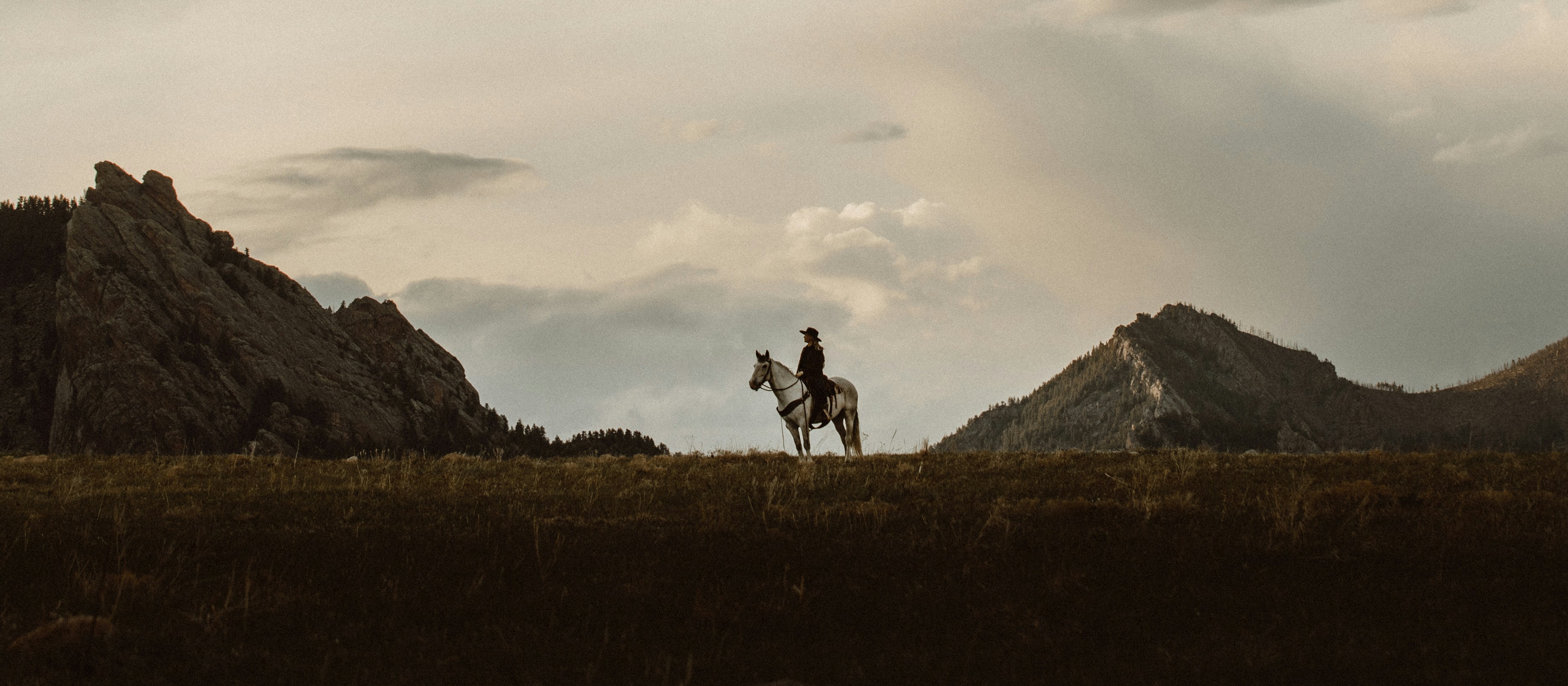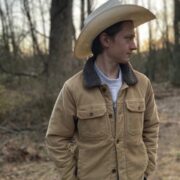The Cowboy: An American Mythology

I recently purchased my first Stetson at the behest of my girlfriend. Some passing comment about “liking a guy in a cowboy hat” simply left me no choice. But I had wanted to own a proper cowboy hat for as long as I can remember. I’ve had my share of costume versions growing up, but those were put away along with the make-believe games they facilitated many years ago. Yet the desire to don that identity persisted; although, as modern city-slicker, it remained entirely out of fashion.
But now that I’ve got my hat, and I feel such an intense sense of satisfaction—an almost childish glee—I am left contemplating exactly what is contained in this iconic garment and why it means so much to me as a young American. After some reflection, I feel that there lies hidden in the cowboy hat an identity and mythology that simply must be revived.
As a folkloric figure, the cowboy is one of the most sophisticated cultural symbols ever to emerge. He contains in himself an entire moral paradigm and life philosophy to match any ancient legend. In dress, he is earthy and pragmatic; prepared to mend fences or fight brigands, but also flamboyant, with his jingling spurs, fringe chaps, and distinctive headpiece. In demeanor, he is a true stoic; a man of few words, his actions deliberate and tempered. But never is he indifferent; while not a zealot (being unconcerned with a puritanical abstinence from gambling, drinking, or women), he is still a profoundly moral man. Apart from driving herds, the cowboy is most often compelled to take part in issues of justice. The life of a cowboy is a saga of moral dilemmas wherein the rigid conventions of law are stretched against the complexities of settling the Wild West. Most commonly, the cowboy is called to thwart the designs of some nefarious outlaw. At the same time, he is found bending the rules for the sake of higher goods. This is quite the nuanced ethic for a gun-slinging herdsman.
And yet, in the Biblical sense, the cowboy as shepherd seems quite the appropriate allusion when we recognize him as our founding mythical hero. Perhaps he, with measured skepticism for the letter of the law, with his proclivity to relish food and drink, and his inextricable link to the land, livestock, and often hapless townsfolk in his care (for which we see him ready to lay down his life), represents some truly transcendent virtues, far above that of a typical farmhand.
The United States and her American culture have been no stranger to crises of identity: American culture is in some way the perpetual-yet-hopeless quest for some unifying narrative or essence which the Old World takes so much for granted. Americans have long felt the absence of castles, crusades, or a culture which extends back beyond the merely historical to the fog of antiquity, when there were still dragons to be slain and Christ’s Chalice might still be sought. And it is in this lacuna that I argue the cowboy stands. The cowboy, as the saddle-weary rancher, as the vigilante, as the deputized lawman, as the homesteading Indian fighter, is at his core a fundamentally and quintessentially American man—maybe there is nothing more American.
The cowboy is a foundational myth because firstly, he founds the nation itself as he defends hearth and home against highwaymen and the unremitting badlands of the American frontier; he was there to shepherd the covered wagons against harrying Indians just as he defended the transcontinental railroad and its emergent towns from desperadoes. Secondly, he is the manifestation of an esprit which is wholly and utterly American to the core. He is the First American in a way the Pilgrims never could be: He embodies the qualities and values with which Americans identify far more than those of the settlers of Plymouth. The cowboy is the paragon of an American soul. He is gritty, raffish, and so steadfast in his principles that he sometimes runs afoul of the sheriff. He is a man with an exacting sense of justice and is, at heart, a man dedicated to his family and his country. He is a settler who imposes order upon an untamed wilderness. Thus, he ensures the security of those laying claim to the West and secures the prosperity of those back in the East. Along with cowboy comes both the brash and adventurous spirit of the Wild West, as well as a sedulous and dutiful commitment to honest work for the cultivation of civilization itself. Like the heroes of old, the cowboy too is a truly grand conqueror. He looms large in his skill and tenacity while remaining humble in his occupation and rustic simplicity.
This American myth captured the collective imagination for decades and really matured in the era of the “Western” as both television serial and Hollywood epic. It was on the silver screen, especially in the boom years of the 1950s, where the cowboy was thoroughly canonized as a folk-hero and national symbol. It was in this age of rampant consumerism and industrialization that the cowboy came to evoke a more romantic America now lost to time. Perhaps, despite more violence and fewer luxuries, the world of the cowboy somehow made more sense than modern America. For all of the moral ambiguity of the Wild West, there was a charming simplicity to a world like that and despite the march of time, there was something timeless captured in this idea. In the popular culture, before there was the superhero, there was the cowboy. And for decades, he remained the unassailable champion for boys far and wide. The cowboy gave boys an unpolished hero—often literally coated in the dust of the plains—who whispered to horses and ladies alike, who had mastered the poker face, was quick on the draw, and always stood up for what was right. This hero was not averse to laboring in the sun, sleeping under the stars, and putting up a fight when needed. This was a hero that sought neither acclaim nor affluence and was never vindictive in the justice he was called upon to administer. The cowboy, like a true knight, was nothing if not polite, doffing his hat to women as he rode into town.
Valiance, dedication, and a little bellicosity: These are the characteristics we must laud for young boys. This role model is far too precious to let go of. To kids he exemplifies the very best of manhood (quaint but virile), and for adults such as I, he remains at the very center of what it means to be an American: He is our Alexander, our Romulus and our Remus. All peoples need their founding myths just as they need their Robin Hood or King Arthur. And as Americans, the cowboy is ours and ours alone. It is imperative that he be preserved and passed down, and that his love of the outdoors, his pioneering spirit, his acceptance of appetite and violence, and his unwavering commitment to fairness not be ceded to the vicissitudes of time.

Daxxton McGee
Daxxton McGee is currently a master’s student in and instructor of biology in North Carolina. Outside of the university, he is a dilettante in history, literature, and theology. Daxxton also performs music at his school’s Catholic ministry.










